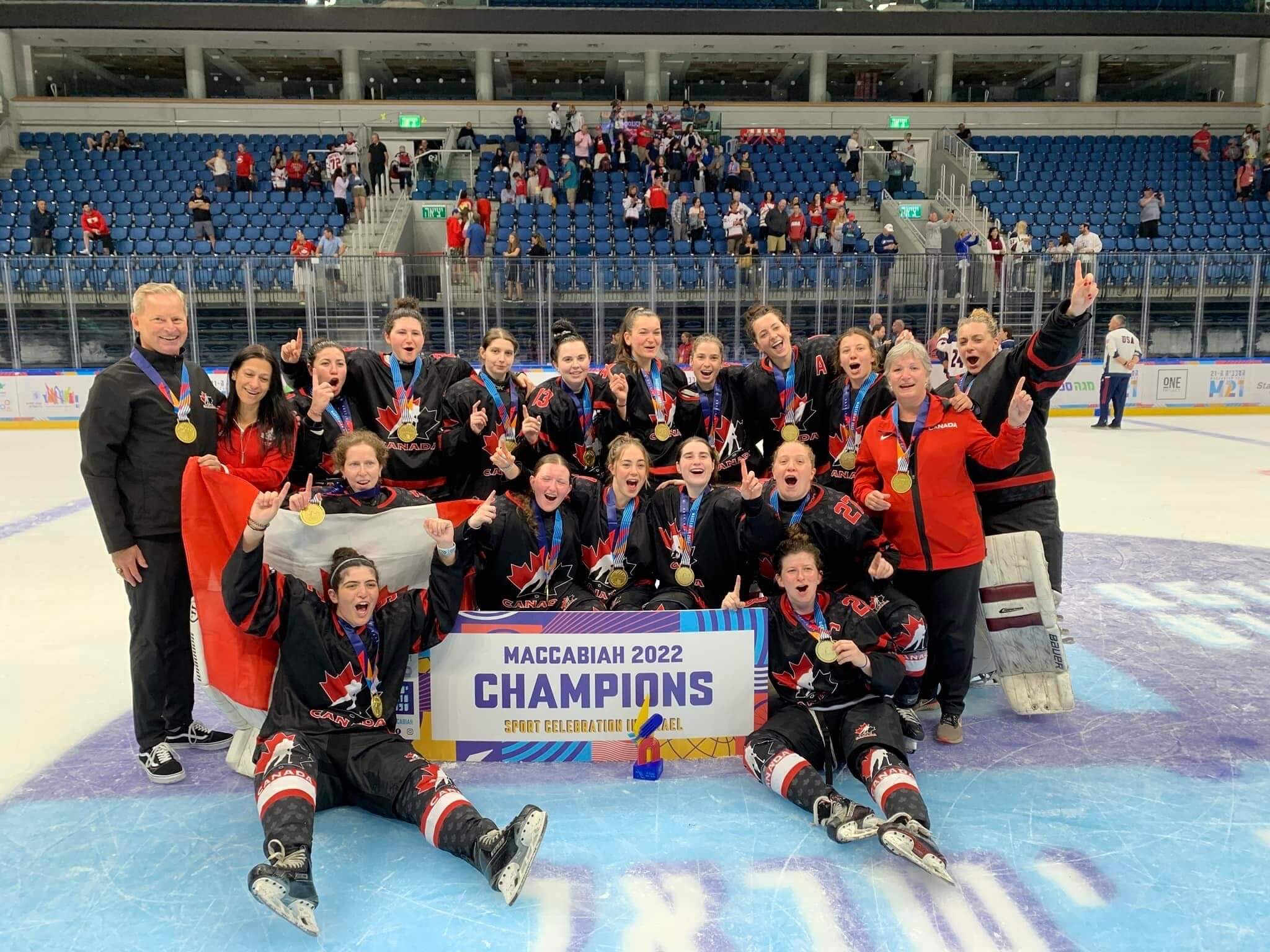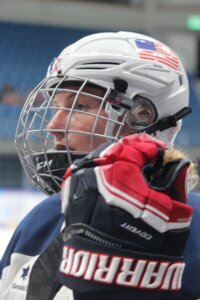Breaking barriers: Women play hockey at Maccabiah Games for the 1st time
U.S., Canadian and Israeli teams meet on the ice: ‘Combining our faith with our sport’

Graphic by Angelie Zaslavsky
JERUSALEM – The Canadian, U.S. and Israeli women’s hockey teams mingled on the ice here Friday afternoon, an unusual scene following a medal-awarding ceremony.
The players’ embraces, back pats, chatter and smiles projected a “we’re all in this together” collegiality, even though Canada had defeated the U.S., 6–2, at the Maccabiah Games.
The celebratory mood reflected the importance of the moment: Women were allowed to compete in hockey at the Maccabiah Games this year for the first time. The multi-sport international Jewish festival, founded in 1932, concludes Monday.
That women’s hockey made it here at all thrilled the U.S. team captain, Chelsey Goldberg. She’d sought for eight years to compete in the Maccabiah.
“Regardless of the score, we all came into the experience with the mindset that this is for the growth of women’s hockey,” Goldberg said later. “It’s nice to share the ice with people who have similar goals.”
Barred from her brother’s team

Goldberg, 29, grew up outside Los Angeles playing roller hockey and ice hockey with her twin brother Chad. She attended high school in Vermont, then played at Northeastern University and professionally in the Canadian Women’s Hockey League.
In the lead-up to the 2013 Maccabiah, Goldberg hoped to play on the men’s team with him, but was refused a tryout. She sought to have women’s hockey included at the Maccabiah that year and in 2017, but didn’t break through until 2021.
Realizing her dream left Goldberg “overwhelmed with emotions of gratitude,” she said after the Americans’ first game here, a 6–4 loss to Canada. (Canada went 5–0 at the Maccabiah, sweeping all three games against the U.S.) “It’s a crazy feeling, knowing this is happening, combining our faith with our sport.”
One player Goldberg recruited, Zoey Pellowitz, of suburban Washington, D.C., was her camper at a hockey program in New Hampshire 10 years ago. The two bonded over the sport and being Jewish, and they stayed in touch.
Playing together and serving as the U.S. team’s assistant captain at the Maccabiah brought things “full circle,” Pellowitz said.
‘Next best thing to the Olympics’
“There was a level of excitement in talking to her leading up to this that I’ve never felt before. You dream as a child about going to the Olympics, and this is the next best thing,” said Pellowitz.
While Israel was the weakest of the three clubs, it was a pivotal actor because of a Maccabiah rule calling for all sports to include the host nation – and the challenges of compiling a female roster in a country where hockey remains largely unknown.
Three of its players were out of action because they couldn’t obtain releases from their military service, leaving just 15 players available, said Esther Silver, the Israeli team’s manager.
The U.S. brought a full 22-player contingent, but Canada mustered only 16 – and that, after repositioning three of its goalies as skaters to form a viable roster.
The U.S. and Canadian teams include collegians, graduates and high schoolers, while Israel’s was younger and far less experienced. Establishing the sport for women at the Maccabiah and growing it in Israel are key short- and long-term goals, according to players, coaches and officials.
On the men’s side, Canada and the U.S. will meet for the gold medal on Saturday night. Two other men’s teams competed: Israel and a European squad that included one American.
The search for Jewish players
Once the Maccabi governing body greenlighted women’s hockey, Goldberg, her teammate Jodi Berris and Melissa Wronzberg, Canada’s captain, worked last winter to build their own and each other’s rosters. They searched for Jewish players online, by networking and through social media.
“These players are pioneers. I assure you that there will be players who will say [post-Maccabiah], ‘I wish I knew about it,’” said Mitch Miller, the manager of Canada’s team.
Miller brought star power by landing Peter Smith, an acclaimed coach for the women’s team at Montreal’s McGill University who earned two gold medals at the Olympics.
“I jumped at it,” Smith, who is not Jewish, said of Miller’s pitch to coach Canada’s Maccabiah team. “I’ve always been really passionate about growing the women’s game. To come to a nontraditional hockey-playing country was attractive.”
He praised the “leadership and intention” of Goldberg and Wronzberg in pushing for the women’s game’s inclusion.
“It’s nice to see when there are players involved in that. It means a lot,” he said.
Nurturing the sport in Israel
The U.S. and Canadian teams were intent on helping to grow the sport in Israel, including by strengthening the host players’ skills.
The Canadians invited their opponents into the locker room following a 24–0 drubbing in the tournament’s opener because the Israelis sought instruction to improve. Before the game and after the second period, Israel’s management passed word to Canada’s that they wanted their opponents’ best effort and not to ease up. During the game, Wronzberg instructed an Israeli player on proper stick positioning for a faceoff.
The next day, Smith and several of his players took the extraordinary step of running the Israelis’ practice session.
“It shows you how much they want to continue to improve,” said Wronzberg, who also helped to lead the practice. “They have such a passion for the game and want to take in everything they can.” Wronzberg scored a hat trick (the term for three or more goals in one game) in the championship game.
Goals for women’s hockey at the 2025 Maccabiah include recruiting additional nations or assembling one European team for the open category (ages 18–35) and adding tournaments for junior and senior players, representatives of the three teams said.
“The more the merrier,” said Devra Schorr, who chairs Maccabi USA’s hockey program. “We’re bringing wonderful athletes here to play ice hockey, and [most] are experiencing Israel for the first time.”
Funding is among the challenges. All American and Canadian athletes are expected to pay an $8,000 per-player fee or raise the funds.
“It’s really important that it’s here,” said Berris, of Portland, Oregon, and at 43 the oldest member of the U.S. team. “Women’s hockey is good hockey. It’s special that I get to be part of this team and play with these highly skilled ladies. It only grows from here.”






















